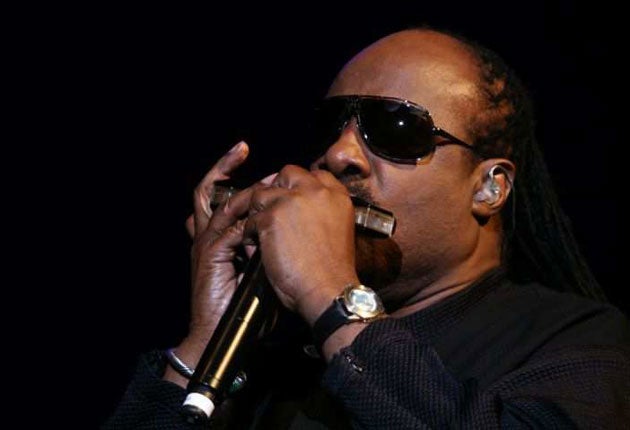As soon as he's led on stage, Stevie Wonder gets a standing ovation from the packed arena audience on the first date of his UK tour – an oddly superfluous tribute, to say the least. An ovation, certainly, but standing? How's he to know, exactly? But it's some measure of the deep affection in which he's held by British fans, whose age span appears, judging by tonight's audience, to cover the proverbial eight to 80 years old – though mostly they're drawn from the forty- to fiftysomethings who grew up on Motown and Talking Book.
Even while the stage is in darkness, the rhythm begins: first, a human-beatbox groove, to which drums and congas are added, then – at Wonder's behest – audience handclaps, to which he adds his trademark harmonica, followed by horns playing the lilting riff to Miles Davis's "All Blues". It's a nice, easy way in to the show, even if one would have preferred "Superstition" or similar. "Miles Davis," mumbles Wonder, "gotta keep the culture alive!" For a short while, it seems as if the culture might actually drown in the swampy sound – both the lower regions of his voice, and especially the subterranean bassline, are distinctly muddy – but by "Master Blaster", things are clearer. Its languid, lollopy reggae groove exemplifies Wonder's engaging bonhomie, which persists despite some trying moments in tonight's show.
Far be it from me to try to tell a bona fide musical genius how to run his show, but Wonder's idea of pacing borders at times on the exasperating. Nobody can raise a crowd like he can, but, conversely, few can kill an atmosphere stone-dead quite as quickly. No sooner has he roused everyone with a "Master Blaster" or "Don't You Worry 'bout a Thing", than he's doused them with a cold shower of some minor ballad or a bout of pointless diva-style vocal showboating, or, at one point, allowing footballer George Boateng and a chum on stage to promote some local tribute to the first professional black footballer. Even the promising employment of a voice-bag vocoder leads not to the expected "Superstition" but to some less worthy song – after which he embarks on a lengthy lecture about his mother's death two years ago, and how he eventually decided to turn the pain around into love, or some such.
There's compensation in the enormous release of pent-up energy that greets "Higher Ground", with its lovely, bubbly bounce and wah-wah guitar chops, but, frustratingly, that's followed by another slough as the band embark on an amorphous jazz-fusion instrumental that seems to last an eternity, with all the musicians allowed their solo spots – that's one drummer, two percussionists, two keyboardists, two guitarists, two horns, and, in a real "Jazz Odyssey" moment, a shapeless blur from the bass player. It's not that they're bad musicians or anything – the solos recall the impeccable buttoned-down playing at a Steely Dan show – but it's all so unnecessary, given Wonder's remarkable back catalogue.
Finally, "Don't You Worry 'bout a Thing" dispels the torpor, particularly joyous as the audience exuberantly sings the chorus back to the star, as if urging him to let loose and continue the uptempo groove; but again, Wonder's aberrant pacing kills the mood with a "Visions" further extended by yet another lengthy lecture about people with vision, such as Louis Braille, whose bicentenary will be celebrated next year – at least, if Wonder has any say in the matter.
Eventually, of course, it all comes good as he leads the band into a string of hits, beginning with a majestic "Living for the City" before stepping back into the Sixties for a swift cruise through "Signed, Sealed, Delivered I'm Yours", "I Was Made to Love Her", "For Once in My Life" and "Uptight (Everything's Alright)", at each stage engaging the audience by getting them to scat or hum rhythms that only make musical sense when he adds the familiar hooks.
It's a strange, somewhat old-fashioned show, in the way we're kept waiting for favourites while Wonder and the band take their own sweet time demonstrating their instrumental prowess, but it's ultimately as impossible to dislike as Wonder is himself. I just wish he'd get to the point a little quicker.
Subscribe to Independent Premium to bookmark this article
Want to bookmark your favourite articles and stories to read or reference later? Start your Independent Premium subscription today.


Join our commenting forum
Join thought-provoking conversations, follow other Independent readers and see their replies